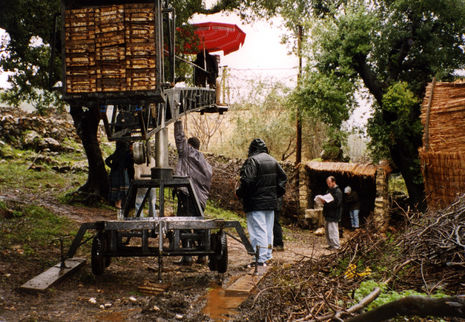The rise of the Netflix BTS film, through ‘Road to Roma’
‘Behind the scenes’ films are the rising Netflix fad, but how have they come about, and do we really like what’s at the heart of them? asks Film & TV Editor Nadia Sorabji Stewart

The “rise of” everything is all anyone seems to talk about: the “rise of” remakes, true crime, biopics... These are the successful but — we can all agree — massively overdone genres of today. Well, if there’s a new “rise of” dawning on the horizon, you’ll have heard about it here first. Let’s talk about the rise of the Netflix ‘behind the scenes’ (BTS) film.
You know the ones I’m talking about. The moment something successful and of some actual cinematic value comes out, Netflix drops a 60-minute exclusive look behind the scenes. It normally promises to reveal the director’s process, the atmosphere on-set and a bunch of interviews of cast and crew praising one another for being “professional” and “just like family”. I can name three off the top of my head: Creating the Queen’s Gambit (The Queen’s Gambit), Behind the Scenes with Jane Campion (The Power of the Dog) and Road to Roma (Roma).
“How far will the tentacles of egocentricity reach?”
These films seem part of the increasing focus on individuals — the biopic-isation of cinema, if you don’t mind the Youtube-ism. Every celebrity must have their own documentary or, if they’re dead, a feature film to show their ‘true’ personality behind the starry image. The tentacles of this egocentricity are stretching out to grope every section of the film industry. Not only do actors have to be celebrities but now directors too! How far will these tentacles reach? Will there be no corner of the film world where ‘the truth behind the star’ can just stay private?
Not only is the self-absorption behind the BTS film troubling, but the creation of it is bizarre: there is an on-set camera filming the cameras that are filming. It all feels very meta. You wonder, did Netflix know that these films would be successes from the get-go and send a special crew to document them? If that’s the case, ego alert! Or did they elegantly cobble together some happenstance footage from filming after the success? Given how quickly the BTS films appear and how available the cast and crew are for interviewing, it would seem to be the former.
“I should have perhaps expected to be disenchanted (never meet your heroes)”
Without wanting to completely dismiss the genre before Netflix has had time to make a billion bucks out of it, in the case of Road to Roma (2020) and Alfonso Cuarón, the whole thing ended up feeling just like that sort of ego trip. He explains in great detail the difficulty of finding objects and actors that resembled as closely as possible the things and people of his childhood, which Roma (2018) is based on. Was his life so special that the film had to be a carbon copy of it? Cuarón barely manages to conceal his smile as he lists difficulty after difficulty, knowing full well that he surmounted them all to create a very worthwhile film. Later on, we see him hug a tearful Yalitza Aparicio (who plays the heroine) after an upsetting scene, and as the credits roll he explains how to use backlighting to a bunch of extras. I found myself wondering how much of a role he might have played in choosing those particularly flattering clips.
Did I need to know that Cuarón is all too aware of his success? Not particularly. Getting to know the process was largely disenchanting. It had been easy to forgive Roma the fact that Cuarón is an incredibly privileged white Mexican and its heroine is the indigenous working-class nanny of Cuarón’s childhood, because it was so clearly a film that cared about her story. His real-life nanny must have had a big role in the conception of the film, it was assumed. But the absence of any discussion about this in Road to Roma suggests that concerns over his cinematic reconstruction of her life never bothered him. Perhaps I should have expected to be disenchanted (they do always say, never meet your heroes), but it nevertheless left a bitter taste in my mouth.
“Cuarón's interest in the universe of a film sheds light on his previous works, like the prominence of the Womping Willow in Harry Potter”
On the other hand, the BTS film shines for its glimpse into the genius behind the personality. At times, Cuarón talks about cinema with devotion. His extremist choices slowly fit into our understanding of his artistic vision, and any would-be future director watching will be glad to have seen a master at work. He explains his rejection of a square frame for a wide one, and how this inspired the slow panning camera movements, allowing the figures to “traverse” the frame: “the film is about the universe and the characters only traverse it.” His interest in the universe, the context for a story, then sheds light on his previous films, like the prominence of the Womping Willow in Harry Potter and the Prisoner of Azkaban (2004) and how it conveyed the central themes of loss and hope. There is clearly something to be said for this democratisation of knowledge about directorial technique.
Ultimately, the long-term effects of all this are yet to be seen. Judging from Road to Roma, the BTS film functions as an ego-stroking, money-making machine that suits Netflix and the cinematic establishment all too well. On the other hand, I did love that little Alfonso Cuarón masterclass. So as much as I am no fan of the self-referential, self-deferential direction that these genres are moving in, I’ll be eagerly lapping up every single new BTS film if they promise to provide models from which to take such artistic inspiration.
 Interviews / You don’t need to peak at Cambridge, says Robin Harding31 December 2025
Interviews / You don’t need to peak at Cambridge, says Robin Harding31 December 2025 News / Unions protest handling of redundancies at Epidemiology Unit30 December 2025
News / Unions protest handling of redundancies at Epidemiology Unit30 December 2025 Comment / What happened to men at Cambridge?31 December 2025
Comment / What happened to men at Cambridge?31 December 2025 Features / ‘Treated like we’re incompetent’: ents officers on college micromanagement30 December 2025
Features / ‘Treated like we’re incompetent’: ents officers on college micromanagement30 December 2025 Theatre / We should be filming ADC productions31 December 2025
Theatre / We should be filming ADC productions31 December 2025








